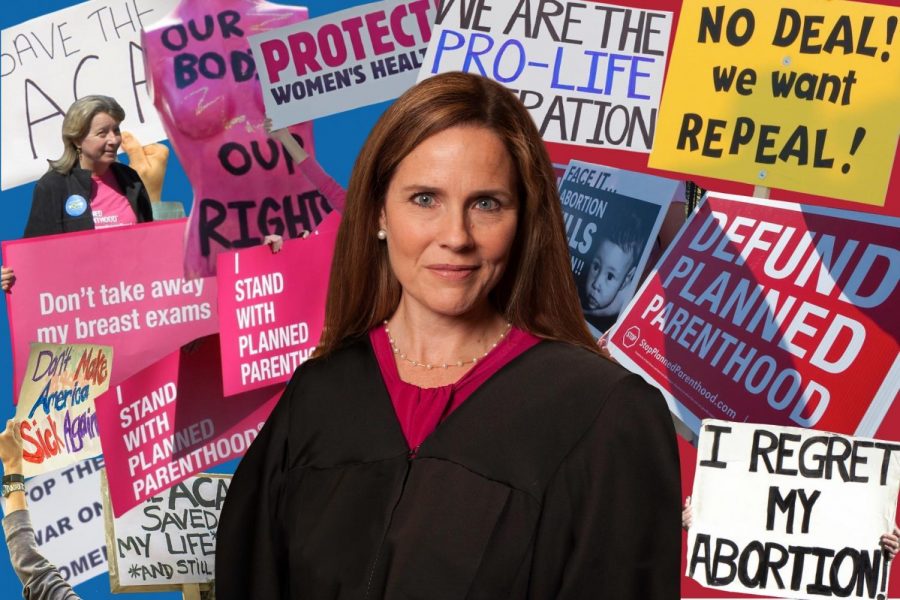Amy Coney Barrett’s nomination to U.S. Supreme Court raises questions about reproductive rights, impacts Oregon minimally
November 9, 2020
Clarification: The headline and photo caption have been updated to better reflect and clarify how Amy Coney Barrett’s rulings on past Supreme Court cases about women’s reproductive rights will affect Oregonians minimally if the laws change in the future.
With President Donald Trump’s nominee, Amy Coney Barrett, on the Supreme Court, there are concerns revolving around the stability of past judicial precedents and future Supreme Court rulings. In Oregon, state laws will not be impacted significantly by Coney Barrett’s nomination.
In particular public concern are the precedents involving reproductive rights, such as Roe v. Wade, and the pending case California v. Texas that involves the constitutionality of the Affordable Care Act — also known as Obamacare.
Ultimately, if Roe v. Wade was to be struck down by a conservative court, Judge Matthew Donohue of the Benton County Circuit Court stated nationwide changes are dependent on each state.
“For a state like Oregon, you would probably see almost no change because the state of Oregon doesn’t place any significant restrictions on a woman’s right to have an abortion or a woman’s right to get contraceptive prescriptions,” Donohue said. “And those laws wouldn’t change. If Roe v. Wade gets overturned, that just removes that federal protection and right that a woman has to seek an abortion.”
Former Justice Antonin Scalia, a prominent mentor figure to Coney Barrett, was a justice who ruled more conservatively on the bench. He believed that the Constitution does not guarantee the right to abortion or same-sex marriage at the federal level.
Rorie Solberg, a political science professor at Oregon State University, specializes in the judicial process of the United States and provided her thoughts on the relation between Coney Barrett’s and Scalia’s ideologies.
Although it is difficult to tell exactly how Coney Barrett will rule while on the bench, the Supreme Court bench is the most conservative it has been in 70 years. Donohue explained the significance behind this phenomenon.
“We know it’s going to be a 6-3 conservative,” Donohue said. “You may see a little more aggressive Supreme Court taking on different kinds of cases that they didn’t before because they didn’t think they had the votes.”
But not all states have the same policy on abortion and reproductive rights as Oregon.
According to Donohue, other states have trigger laws, which are laws that have not yet gone into effect due to legal barriers. For instance, Roe v. Wade prevents states from passing state level anti-abortion laws.
“But if that barrier is removed, that law springs into effect immediately,” Donohue said. “It wouldn’t be the next day or something like that, maybe 30, 60, or 90 days. What you would see in those states is more restrictive legislation going into effect. There wouldn’t be a legislative process necessary to enact them.”
For other states that do not have trigger laws or laws that allow for abortions, Donohue described the third group of states that have tried to pass laws restricting abortion in the past but were blocked by Roe v. Wade. If the precedent is overturned, then the states in this third group would have to undergo the legislative process in order to restrict abortion.
But even if Roe v. Wade is struck from legal precedent, the federal government is unlikely to ban women from receiving abortions. “Congress would have to find the authority in one of their enumerated powers to ban abortion, and that would be a stretch,” Solberg said.
Solberg said the Supreme Court very rarely overturns precedent in the first place. “The Court rarely makes a 180-degree turn. The institution generally moves slowly.”
Regarding California v. Texas, she stated that there could be multiple ways the case can be concluded and how ACA is potentially affected.
“The Court could avoid the entire case by determining that the plaintiffs do not have standing to bring the suit. Additionally, ruling that minimum coverage provision is unconstitutional doesn’t mean that the whole ACA dies. The Court could rule that the provision falls but it is severable from the rest of the law and so some of the ACA remains.”
But until a court or even one justice begins receiving cases and passes rulings, it is difficult to predict the extent of changes and their impacts. And in some cases, nominated justices rule in a way that even the president that nominated them could not foresee.
“John Roberts, a conservative, was appointed by a conservative president, but turned out to be somewhat of a swing voter on the court,” Donohue pointed out. “Earl Warren, Chief Justice, was appointed by Eisenhower, who was a Republican president. The idea was that Warren would be a conservative judge, but he turned out to be one of the more liberal justices on the Supreme Court.”
Donohue explained that these changes are hard to predict due to the unique dynamic of the Supreme Court.
“The appointment process… is a political process and it’s done by politicians,” Donohue said. “But when you become a justice, it’s a lifetime appointment. The ideological beliefs that you have take a backseat to what the law actually says.”
Donohue stressed one important message: the Supreme Court is only one check within the “checks and balances” system in our federal government.
“If the legislature doesn’t like what the Supreme Court’s doing, not only can they pass laws that will address some of those issues, the federal legislature does have some authority to restrict the cases the Supreme Court can hear,” Donohue said. “Remembering the role the Supreme Court plays in federal government and that it’s not omnipotent is important to figuring out the impact that they will ultimately have.”
The U.S. Supreme Court is scheduled to have hearings on Nov. 10 regarding ACA and whether or not it will stay in effect.



















































































![Newspaper clipping from February 25, 1970 in the Daily Barometer showing an article written by Bob Allen, past Barometer Editor. This article was written to spotlight both the student body’s lack of participation with student government at the time in conjunction with their class representatives response. [It’s important to note ASOSU was not structured identically to today’s standards, likely having a president on behalf of each class work together as one entity as opposed to one president representing all classes.]](https://dailybaro.orangemedianetwork.com/wp-content/uploads/2025/03/Screenshot-2025-03-12-1.00.42-PM-e1741811160853.png)























